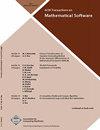稀疏近似分解与混合精度迭代细化的结合
IF 3.2
1区 数学
Q2 COMPUTER SCIENCE, SOFTWARE ENGINEERING
引用次数: 7
摘要
线性系统的标准基于LU因子分解的求解过程可以通过采用混合精度迭代精化来提高速度或精度。最近的工作集中在密集系统上。我们研究了混合精度迭代精化的潜力,以增强基于近似稀疏因子分解的稀疏系统方法。在这样做的过程中,我们首先在LU因子分解的一般模型下,为基于LU和GMRES的迭代精化开发了一种新的误差分析,该模型考虑了现代稀疏求解器通常使用的近似方法,如低秩近似或放松的枢轴策略。然后,我们基于一组选定的迭代细化变体和近似稀疏因子分解,对不同算法的执行时间和内存消耗进行了详细的性能分析。我们的性能研究使用了多前沿求解器MUMPS,它可以利用块低秩因子分解和静态枢轴。我们评估了算法在来自各种现实生活和工业应用的大型稀疏问题上的性能,表明混合精度迭代精化与近似稀疏因子分解相结合可以显著减少时间和内存消耗。本文章由计算机程序翻译,如有差异,请以英文原文为准。
Combining Sparse Approximate Factorizations with Mixed-precision Iterative Refinement
The standard LU factorization-based solution process for linear systems can be enhanced in speed or accuracy by employing mixed-precision iterative refinement. Most recent work has focused on dense systems. We investigate the potential of mixed-precision iterative refinement to enhance methods for sparse systems based on approximate sparse factorizations. In doing so, we first develop a new error analysis for LU- and GMRES-based iterative refinement under a general model of LU factorization that accounts for the approximation methods typically used by modern sparse solvers, such as low-rank approximations or relaxed pivoting strategies. We then provide a detailed performance analysis of both the execution time and memory consumption of different algorithms, based on a selected set of iterative refinement variants and approximate sparse factorizations. Our performance study uses the multifrontal solver MUMPS, which can exploit block low-rank factorization and static pivoting. We evaluate the performance of the algorithms on large, sparse problems coming from a variety of real-life and industrial applications showing that mixed-precision iterative refinement combined with approximate sparse factorization can lead to considerable reductions of both the time and memory consumption.
求助全文
通过发布文献求助,成功后即可免费获取论文全文。
去求助
来源期刊

ACM Transactions on Mathematical Software
工程技术-计算机:软件工程
CiteScore
5.00
自引率
3.70%
发文量
50
审稿时长
>12 weeks
期刊介绍:
As a scientific journal, ACM Transactions on Mathematical Software (TOMS) documents the theoretical underpinnings of numeric, symbolic, algebraic, and geometric computing applications. It focuses on analysis and construction of algorithms and programs, and the interaction of programs and architecture. Algorithms documented in TOMS are available as the Collected Algorithms of the ACM at calgo.acm.org.
 求助内容:
求助内容: 应助结果提醒方式:
应助结果提醒方式:


